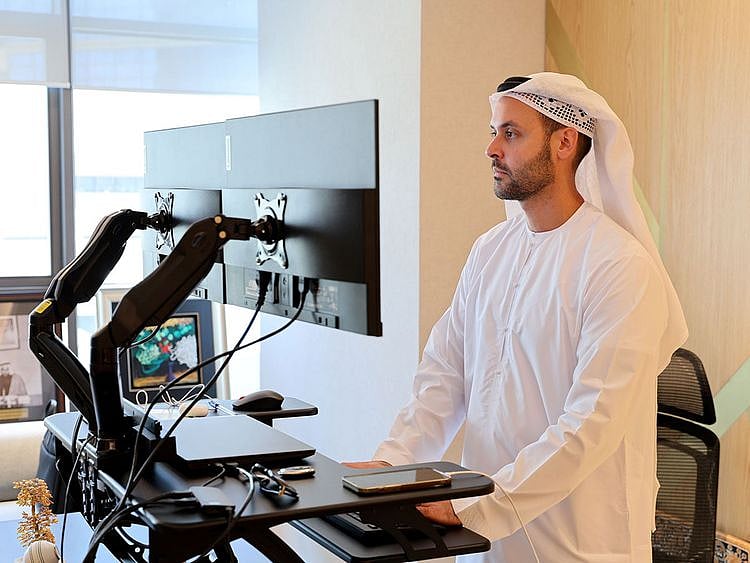More than 114,000 Emiratis now employed in private sector
Some 81,000 Emiratis are hired by private companies since the launch of ‘Nafis’ in 2021

Abu Dhabi: More than 114,000 Emiratis are now employed in the private and banking sectors in the UAE, revealed a new report. This includes at least 81,000 Emiratis hired after the launch of Nafis program in September 2021.
The numbers were released as the Emirati Talent Competitiveness Council celebrated its third anniversary. During the last three years, the Nafis program has achieved remarkable milestones, surpassing its targets by significantly increasing the number of Emiratis working in the private sector.
Over the past three years, the Emirati Talent Competitiveness Council has established numerous constructive partnerships that have contributed to the employment of Emiratis within the workforce of more than 21,000 private companies.
On this occasion, Mohammad Al Gergawi, Minister of Cabinet Affairs, Member of the Board of Directors, and Chairman of the Executive Committee of the Emirati Talent Competitiveness Council, emphasised the UAE leadership’s commitment to empowering its citizens, recognising them as the country’s most valuable resource.
He also highlighted the crucial role of Nafis program in preparing a remarkable generation of Emirati talent and leaders capable of meeting the future’s demands through their contributions to the private sector, thereby elevating the national economic system. He expressed confidence in the future achievements that Nafis will continue to bring.
Financial support, training
Meanwhile, Dr Abdulrahman Al Awar, Minister of Human Resources and Emiratisation and Acting Minister of Higher Education and Scientific Research, Member of the Board of Directors and Chairman of the Advisory Committee of the Emirati Talent Competitiveness Council, emphasised the importance of the achievements made by the Nafis program.
He noted that these accomplishments reflect the success of the innovative strategies and programs adopted by the Council under the guidance and supervision of Sheikh Mansour bin Zayed Al Nahyan, Vice President, Deputy Prime Minister, Chairman of the Presidential Court, and Chairman of the Board of Directors of the Emirati Talent Competitiveness Council.
He pointed out that the financial support, training, and qualification programs provided by Nafis have significantly contributed to the Emiratization efforts, achieving unprecedented historical milestones in the number of Emirati citizens joining the private sector, who are considered a strategic partner of the government in this important national endeavour.
National economy
Ghannam Al Mazrouei, Secretary General of the Emirati Talent Competitiveness Council, said: “Nafis has received exceptional support from our visionary leadership over the past three years, with a focus on placing citizens at the top of its priorities. We take pride in the fact that over 114,000 Emiratis are now working in the private sector across various professional fields, contributing effectively to the national economy,” he added.
He encouraged Emirati youth currently working in the private sector, as well as job seekers, to visit Nafis platform and register for the program. This will allow them to explore the constantly updated job opportunities and training programs available on the platform.
Leading Programs
Nafis includes a variety of financial support programs, such as the Emirati Salary Support Scheme, Pension Program, Child Allowance Scheme, and Unemployment Benefit.
Additionally, the platform offers specialised training programmes, including the Talent Program, Apprentice Program, and Career Counselling Program,
The National Healthcare Program is considered one of the most significant initiatives under the Nafis, attracting a large number of Emirati citizens. This is especially due to the introduction of the Studying Citizen Employment Contract launched by the Ministry of Human Resources and Emiratisation, which ensures suitable employment for citizens while they pursue their studies.
Additionally, the Creatives Program, in collaboration with the Ministry of Culture, aims to prepare national talents in the creative industries sector.
Also Read
ADNOC, Nafis to create 13,500 private sector jobs for UAE nationals by 2028UAE President welcomes winners of second edition of Nafis Award201% rise in private sector jobs for Emiratis post-Nafis programme in UAEUAE: How the Nafis programme guides career aspirations of job seekersMore initiatives
In addition, Nafis initiatives include the Teaching Specialists Program which aims to empower and train Emirati talents in the education sector, and the Industrialists Program in collaboration with the Ministry of Industry and Advanced Technology, which seeks to qualify and train Emiratis for roles in the industrial sector.
Also launched this year is the Media Apprenticeship Program in partnership with the UAE Media Council, which aims to develop the skills of Emirati talents in the media sector and prepare a new generation of leaders in this vital field.
The Nafis program also includes Apprentice Program aimed at supporting the integration of Emirati students into the skilled private sector workforce by providing them with practical experience during various stages of their educational journey.
In addition, specialised guidance programs are available for both private sector employees and companies, aimed at raising awareness of decisions and initiatives related to Emiratisation and the Nafis.
These programs also highlight the benefits offered by the Ministry and the Nafis to companies and individuals to support and empower Emirati talent and enhance their participation in the private sector workforce.
Sign up for the Daily Briefing
Get the latest news and updates straight to your inbox
Network Links
GN StoreDownload our app
© Al Nisr Publishing LLC 2026. All rights reserved.